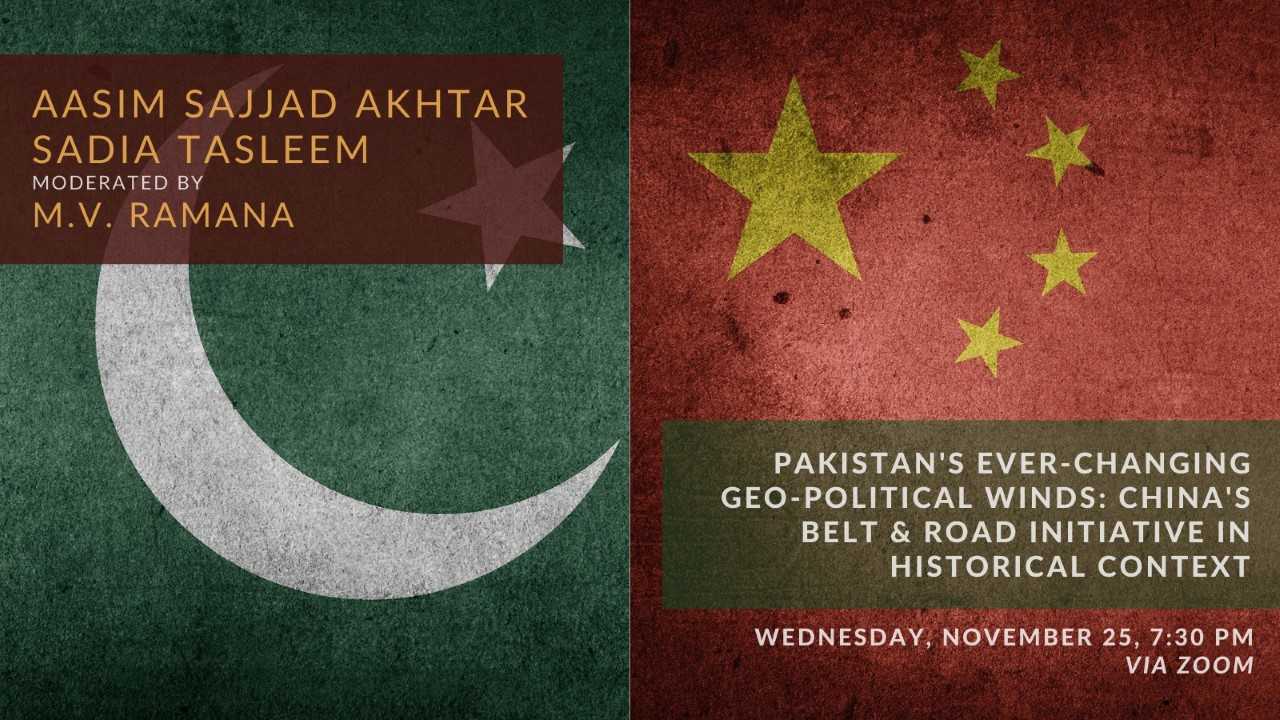
In this online encounter, the presenters will explore the historical context of China’s Belt & Road Initiative in the context of Pakistan.
China-Pakistan Economic Corridor (CPEC), the flagship project of the China’s Belt & Road Initiative, will usher in more than US$60billion of investment into Pakistan. With an emphasis on road construction from the Pakistan-China border in the north down to the Gwadar Port in the insurgency-wracked Balochistan province in the south, as well as power generation and information technology, CPEC has been hailed as a ‘game-changer’ by planners and strategists within Pakistan. On the face of it, China’s growing ‘developmental’ footprint in Pakistan can be contrasted with the role of the country’s major patron, US, which has traditionally focused on military and strategic cooperation over economic aid per se. There is evidence to suggest, however, that CPEC is as much a strategic intervention as as purely developmental one, and will buttress the power of Pakistan’s preeminent political and economic power, the army. Furthermore, CPEC’s design and implementation to date have raised concerns that long-standing regional conflicts within the country will be exacerbated, not to mention ecological fallouts.
PRESENTERS:
Aasim Sajjad Akhtar is Associate Professor of Political Economy at the National Institute of Pakistan Studies, Quaid-i-Azam University. He was previously at the Lahore University of Management Sciences (LUMS). Prof. Akhtar works on diverse subjects such as state theory, informality, colonial history, and social movements. He has published widely in journals such as Third World Quarterly, Journal of Contemporary Asia, Journal of Peasant Studies and Critical Asian Studies. He is also the author of three books, most recently The Politics of Common Sense: State, Society and Culture in Pakistan (Cambridge, 2018). He also writes a syndicated column for Pakistan’s newspaper-of-record, DAWN. Alongside his academic pursuits, Prof. Akhtar has also been closely affiliated with political and social movements in Pakistan for more than two decades.
Sadia Tasleem is currently a PhD student at UBC and a lecturer at Quaid-i-Azam University’s Department of Defense and Strategic Studies in Islamabad, Pakistan. As a Robin Copeland Memorial Fellow for Nonproliferation from 2014 to 2015, she investigated the prospects of “Creating a Constituency for Unilateral Nuclear Arms Restraint in Pakistan.” She regularly delivers lectures on strategic stability and nuclear deterrence to senior officers at Pakistan Air Force and Pakistan Navy. She has done extensive research on various aspects of Strategic Stability, Nuclear Learning and the implications of Knowledge Diffusion as a core member of the Program on Strategic Stability Evaluation (POSSE). Presently, she is a core member of Asia-Pacific Leadership Network for Non-Proliferation and Disarmament. Previously, she worked as a senior research scholar at the Institute for Strategic Studies, Research and Analysis at the National Defense University; a research associate at the International Islamic University; and a lecturer at the Department of International Relations at the National University of Modern Languages in Islamabad.
MODERATOR:
M. V. Ramana is Professor and Simons Chair in Disarmament, Global and Human Security at the School of Public Policy and Global Affairs (SPPGA), University of British Columbia. His research interests are in the broad areas of international security and energy supply, with a particular focus on topics related to nuclear energy and fissile materials that can be used to make nuclear weapons. He combines technical skills and interdisciplinary methods to address policy relevant questions related to security and energy issues.
Presented in partnership with the UBC School of Public Policy and Global Affairs and Green College UBC.